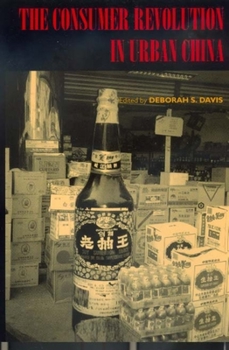The Consumer Revolution in Urban China: Volume 22
(Part of the Studies on China Series)
Select Format
Select Condition 
Book Overview
After decades of egalitarian, restricted consumption, residents of China's cities are surrounded by a level of material comfort and commercial hype unimaginable just ten years ago. In this first in-depth treatment of the consumer revolution in China, fourteen leading scholars of Chinese culture and society explore the interpersonal consequences of rapid commercialization. In the early 1980s, Beijing's communist leadership advocated decollectivization, foreign trade, and private entrepreneurship to jump-start a stagnant economy, while explicitly rejecting any notion that economic reforms would promote political change. However, by the early 1990s the reforms in the marketplace not only produced double-digit growth but also enabled ordinary citizens to nurture dreams and social networks that challenged official discourse and conventions through millions of daily commercial transactions. Using participant observation, contributors to this book describe and analyze a wide range of these changing consumer practices: luxury housing, white wedding gowns, greeting cards, McDonald's, discos, premium cigarettes, bowling, and more.
Format:Paperback
Language:English
ISBN:0520216407
ISBN13:9780520216402
Release Date:January 2000
Publisher:University of California Press
Length:379 Pages
Weight:2.10 lbs.
Dimensions:1.0" x 6.1" x 9.0"
Customer Reviews
2 ratings
If you're interested in Chinese studies...
Published by Thriftbooks.com User , 18 years ago
There are some definite highs and lows in Deborah Davis' book (lows being the very first chapter on housing developments and an entire chapter devoted to greeting cards), but the book gives a very in-depth analysis of the effects rapid consumption in urban areas has had on the daily life of urban Chinese citizens. Davis selects essays that show changes in culture, like the essays regarding McDonald's, discos, and bowling. Davis even shows us consumption patterns in the more marginal cultures of China. For instance, there is an essay devoted to the Hui (an Islamic minority in China) wedding tradition. Since rapid consumption has happened in China, these Hui women are starting to wear more Western-style wedding dresses. These dresses greatly resemble the dresses we see everywhere in America, with the exception that the Hui women's dresses are brighter in color (coral, pink, red). Davis also devotes much of the book to showing changes in eating traditions. One chapter on outdoor food markets explains the shady side of economics in China. Food vendors will cheat Chinese so much that some Chinese will bring their own scales to weigh the food. Also, in the chapter dealing with the influx of McDonald's into urban China, we can see that the push for modernity can sometimes win over Chinese tradition. For instance, some people will go into McDonald's and just sit by the window so they can have a sense of superiority over the people walking by on the street. Many Chinese people don't even like the food at McDonald's, but feel the need to go to express their modernity. Davis' book shows us many different effects of the consumer revolution, both good and bad. I recommend this book for anyone interested in studying China. Just don't get discouraged when you come across a dry chapter!
An insight into the sociology of consumption in China
Published by Thriftbooks.com User , 24 years ago
The consumer revolution in China is a relatively recent phenomena with the former state controlled society slowly moving to a capitalist market where the individual is beginning to exercise choice in his/her consumption decisions. Chinese consumer behaviour is therefore a relatively unchartered area and this collection of studies by 14 authors provides a socio-political context for a range of consumer practices. The studies range from a semiotic analysis of advertising for luxury housing in Shanghai to an analysis of the social impications of the emerging trends of adopting Western bridal wear, purchasing greeting cards, and visiting discos. The book helps the reader get under the skin of an otherwise impenetrable consuming society with anecdotes and insights not available anywhere else. It makes for highly absorbing reading and I would recommend it to anyone interested in gaining an understanding of consumers in this unique market






